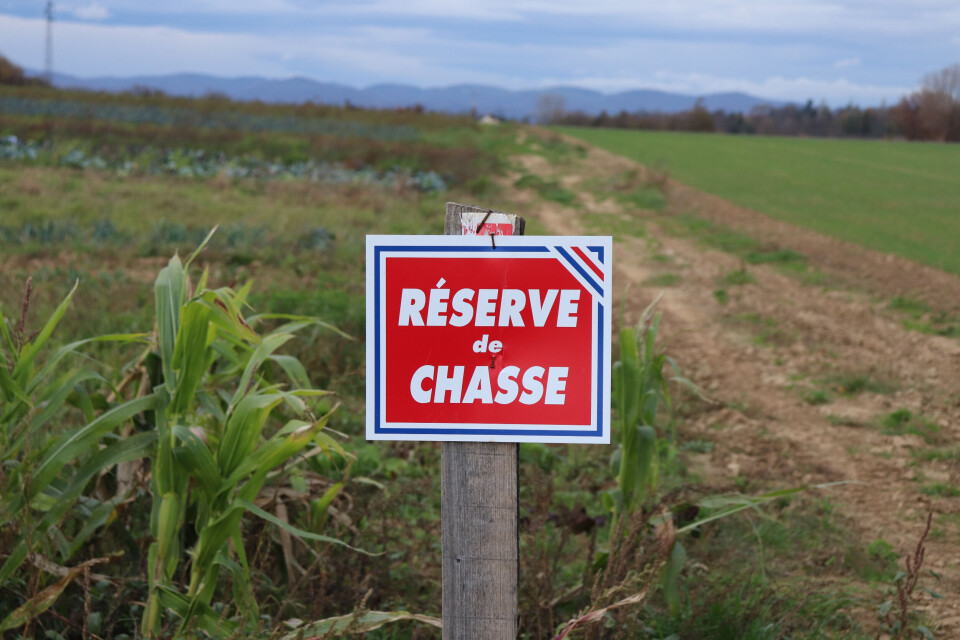-
How many Americans live in Paris - and where else are they choosing in France?
Over a quarter of all US nationals in France live in the capital city
-
Price rises for Netflix in France
The Standard (with ads) and Premium packages are increasing by €24 a year
-
Leclerc supermarkets to sell car fuel at cost price for Easter
The initiative will apply to diesel, petrol, and LPG
French Senate debates whether to ban drinking while hunting
The chamber has proposed a formal ban on hunting while inebriated, which is not technically illegal in France. Hunters say the report is ‘stigmatising’

The French Senate is considering whether to formally ban the consumption of alcohol or narcotics (although the latter is illegal anyway) while hunting, as current laws in France do not explicitly make it illegal to hunt while drunk or drugged.
A new bill proposes to “ban alcohol and narcotics during a hunt”, as part of its report on making hunting safer in France, and to make the rules on alcohol consumption when hunting the same as those for driving.
The report was submitted on Wednesday, September 14, following on from discussions held as a result of a petition signed by 120,000 people from across the country called for more regulation and limits to the practice.
The Senators wrote: “At present, hunting under the influence of alcohol is not formally prohibited.”
In proposal 12 of the report, they therefore propose “to prohibit alcohol and narcotics when hunting" and "to align the blood alcohol level and the prohibition of narcotics as well as their respective penalties with the rules in force for the highway code”.
Hunting federations: ‘It’s a caricature’
However, hunting bodies have not welcomed the report.
Antoine Herrmann, director of the Rhône hunters' federation, told BFMTV: “[This report] suggests that everyone hunts under the influence of alcohol or drugs.” He said that the Senate was “stigmatising” hunters, and contributing to the stereotype of the “drunk hunter”.
Alain Messal, a hunter in Haute-Garonne, told RMC: “They are making us out to be killers, it’s like a caricature based on unfounded ideas, as today hunters are not drunkards.”
Jean-Bernard Portet, president of the Haute-Garonne hunter’s federation, said: “To this day, I have never had any reports of a case of inebriation of hunters while they are practicing their passion.”
However, some cases of inebriated hunters have been reported nationwide. In March, newspaper Ouest France reported on the case of a male driver who was found to have more than 2g of alcohol per litre of blood after a day's hunting and a hunting dinner. A similar case was reported by Midi Libre in early September.
And while it is not technically illegal to be drunk or drugged while hunting, hunters can be caught by a roadside check if they are found to be inebriated before, during, or after a hunt, or if they appear to be drunk in public.
In the event of a hunting accident, perpetrators are also checked for traces of drink or drugs.
However, animal association PETA told BFMTV: “Sanctions only happen in case of an accident, but by then it’s already too late.”
Some hunting federations ban the consumption of alcohol before or during a hunt themselves, including the Gard federation.
On its website, it states that it bans “hunting under the influence of drugs or alcohol" and being "in a state of intoxication, within the limit of alcohol in the blood that is authorised by law in the context of road traffic".
Mr Hermann, in Rhône, also said that hunters are required to have passed a training course, in which the danger of alcohol consumption is covered. He also said that most hunters will drive to and from a hunt, meaning that the rules of the road already lead to a “certain vigilance”.
The Senate report itself admitted: “Only 9% of hunting accidents are linked to alcohol or drugs, which is not an insignificant proportion, but far less than the stereotypes, even though tests are not done on less-severe accidents.”
It said that this was a lower percentage than seen among road accidents, with 13% of drivers who get into accidents (fatal or otherwise) being affected by alcohol.
However, the Senate said that “this proportion still justifies this legal change, as its addition to the environmental code will enable agents from [the French biodiversity office] the OFB to do tests and to impose sanctions”.
Animal rights groups: ‘Scandalous’
Animal rights groups have not welcomed the report either, saying that it does not go far enough.
The Fondation Droit Animal said that the proposals were “not very compelling…and even scandalous”, and said it “regretted” that the Senate had not held onto some of its suggestions, such as imposing regular ‘no-hunting’ days.
❌Le @Senat a publié hier soir le rapport de sa mission sur la sécurisation de la #chasse. La LFDA déplore des mesures peu intéressantes, voire carrément scandaleuses, comme le délit d'entrave à la chasse. Nous regrettons que nos propositions n'aient pas été retenues. pic.twitter.com/jniXAIi6qg
— Fondation Droit Animal, Éthique et Sciences (LFDA) (@fondationLFDA) September 15, 2022
It said: “Only two proposals make sense: a ban on alcohol consumption and a mandatory annual medical certificate.”
It is not yet clear if the proposal will definitely go on to become law, but it has certainly reignited the ongoing debates around the safety of hunting in France, which have been sparked in recent years after an apparent surge in accidents.
Related articles
Hunter, 17, questioned after woman shot dead on walking path in France
Have hunting accidents become more or less frequent in France?
How often do hunting accidents happen in France?
Hunter shot in chest, bullet hits car: More hunt accidents in France
























